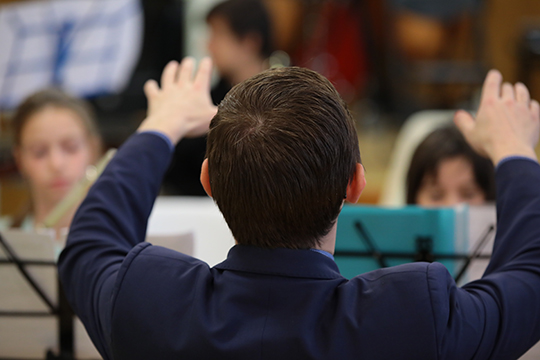One of my greatest worries when rehearsing an ensemble is whether I am hearing reality, or hearing what I want to hear. It is an extremely common problem we should all guard against. In many ways, it is a form of confirmation bias, which in layman’s terms is when we see what we want to see, think what we want to think, believe what we want to believe, or hear what we want to hear. Simply put, are we seeing and hearing what is actually happening, or do we perceive what we want that to be?
I remember being asked to listen to the dress rehearsal of a band before they were headed to contest. The band played very well. I think. But I really couldn’t tell because all I could hear for almost the entire performance of their first piece was the pounding – I mean earth-shattering, mind-numbing – thrashing of that poor bass drum. I saw wind players’ fingers move, but I really couldn’t hear them much at all. When I casually asked the director about the bass drummer’s playing, the director said, “Isn’t he great? He really keeps the band together.” That, my friends, is confirmation bias in a nutshell. My guess is that early rehearsals of that piece had the ensemble phasing greatly. Little by little, day by day (and more often than not, I believe that is the key to this problem), that percussionist got louder and louder in an effort to stabilize the band. And that was probably met with praise from the conductor since it was getting better. At least the phasing part was. As time went on, that became normal and usual. In any other circumstance, I am sure that director would have heard the reality of that relentless pounding, but in this situation, he grew to be unaware of it. This happens to all of us. Picture a student who has been struggling to get over the break of their clarinet for quite a long time. Finally, they get it! I can easily picture us being so excited with that progress that we forgive their uncharacteristic tone (how is that for being nice!) or weak tonguing. If each of us stays vigilant to identify when the dilemma is happening, work to truly hear reality, records our ensembles so we assess more objectively, and ask others to listen to our groups (whether live or from recordings), we can prevent that insidious problem from happening.
Peter Loel Boonshaft, Director of Education
KHS America
The content of this Blog article or Banded Story is the intellectual property of the author(s) and cannot be duplicated without the permission of KHS America and/or the author(s). Standard copyright rules apply.



 We look forward to the evolution of this exciting program, and welcome feedback on how we can further enhance the work that you do in music education.
We are excited to offer your program the opportunity to join the KHS America Academic Alliance today.
We look forward to the evolution of this exciting program, and welcome feedback on how we can further enhance the work that you do in music education.
We are excited to offer your program the opportunity to join the KHS America Academic Alliance today.